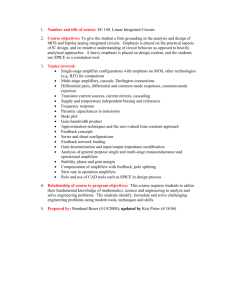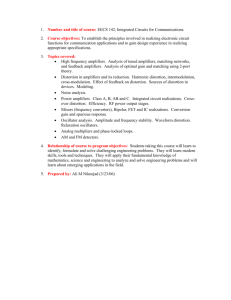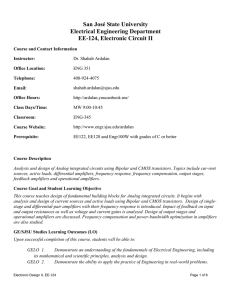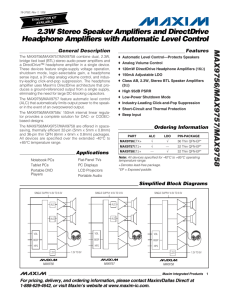TECH 169 Brown SP14 - Aviation and Technology
advertisement
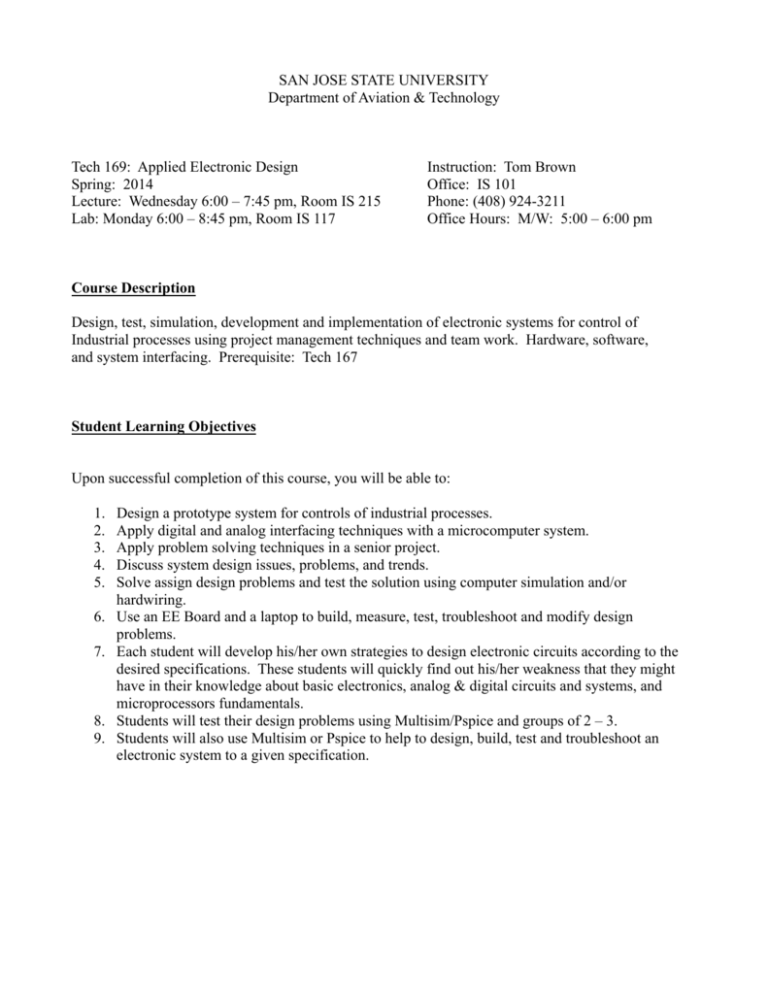
SAN JOSE STATE UNIVERSITY Department of Aviation & Technology Tech 169: Applied Electronic Design Spring: 2014 Lecture: Wednesday 6:00 – 7:45 pm, Room IS 215 Lab: Monday 6:00 – 8:45 pm, Room IS 117 Instruction: Tom Brown Office: IS 101 Phone: (408) 924-3211 Office Hours: M/W: 5:00 – 6:00 pm Course Description Design, test, simulation, development and implementation of electronic systems for control of Industrial processes using project management techniques and team work. Hardware, software, and system interfacing. Prerequisite: Tech 167 Student Learning Objectives Upon successful completion of this course, you will be able to: 1. 2. 3. 4. 5. 6. 7. 8. 9. Design a prototype system for controls of industrial processes. Apply digital and analog interfacing techniques with a microcomputer system. Apply problem solving techniques in a senior project. Discuss system design issues, problems, and trends. Solve assign design problems and test the solution using computer simulation and/or hardwiring. Use an EE Board and a laptop to build, measure, test, troubleshoot and modify design problems. Each student will develop his/her own strategies to design electronic circuits according to the desired specifications. These students will quickly find out his/her weakness that they might have in their knowledge about basic electronics, analog & digital circuits and systems, and microprocessors fundamentals. Students will test their design problems using Multisim/Pspice and groups of 2 – 3. Students will also use Multisim or Pspice to help to design, build, test and troubleshoot an electronic system to a given specification. Textbooks • • No textbook is required for this course. Students need to review the textbooks from previous electronics courses, do library/internet research, participate actively in class and attend lectures. Evaluation The final grade for the course will be based on the following items: Solutions sign Problems/Home Work Senior Project Midterms Midterm #1 February 26 Midterm #2 April 09 Final Examination May 21 20% 50 15 200 points 500 150 15 150 Grading Scale The approach to grading is designed to mimic, as much as possible your performance when working for a company. Of course, when working for a company, points or percentages are not assigned by a supervisor when you turn in an assignment. Rather, you will be evaluated, promoted or fired, based on whether you accomplished the assigned task, the quality of your work and if you meet the deadline. Course grade will not be curved; it is possible for everyone in the class to get an A (or an F). Your grade depends only on your performance, not on how everyone else in the class does. Thus, there is no reason not to help your class mates in every legal way possible. Course grades will be assigned according to the following scale. A+ A A- 97 – 100% 93 – 96% 89 – 93% B+ B B- 85 – 88% 81 – 84% 77 – 80% C+ C C- 73 – 76% 69 – 72% 65 – 68% D+ D F 61 – 64% 57 – 60% 0.0 – 56% Class Participation 1. You will work in groups of 2 – 3 students to answer the design problems assigned to you by the instructor. Each design problem will be submitted by the target date by each class member within the group. 2. You may ask the instructor questions only after first asking your classmates. 3. It is expected that you will become an active participant of your own learning. 4. Each design problem will be assigned by the instructor with its target date to complete. All assigned design problems must be submitted on its target date whether it is complete or not. 5. You will be assigned a design problem or homework or both weekly or biweekly depending upon the complexity of the assignment. Solutions to Design Problems You are to have a mathematic analysis for the design supported by software. In some cases you will build and debug your design in our weekly Monday lab. Senior Project Students will select a project that is challenging, that will allow them to learn new concepts, and improve upon their troubleshooting skills. The project must be finish in 10 weeks (April 28). Submit your proposed project no later than the 2nd week of school. You must meet this initial dead line. Once your project has been submitted and approved by the instructor; it cannot be changed. Depending on the complexity of the selected project the instructor might add some required features. Do not start a project without the instructor approval. By the way, these are individual projects. You are entirely responsible for the completion of your project which include the design, assemble, test, troubleshoot, debug, repair and packaging. It is strongly recommended that you establish a time table for your project completion. As a matter of fact, the instructor will be tracking each student project weekly to inform him/her as to where you are or where you should be to stay on schedule to complete your project within the allotted time period. Keep a log of all your works, e.g. revision(s) of the circuit design and/or software programs, problems encountered, different design and assembly techniques, etc. Track your project with your on individual schedule. Remember, if the project does not work, you will repeat the course. Senior Project Evaluation The following evaluation criteria will be used: • • • • • • Functional Meet its specifications and requirements Completeness Quality Presentation Effort Written Report The senior project written report should include, but not limited to, the following items: • • • • • • Introduction Circuit Analysis Procedure – how to test your circuit or system • Hardware • Software Problems Encountered/Troubleshooting/Debugging Conclusions Appendix • Original design schematic • Final version schematic • Parts List • Software programs • References Project Presentation Progress Students will present progress of their projects to the class bi-weekly or when requested by the instructor. This discussion will be done within the first 30 minutes of the lab which will allow each student to get any assistance from class members and the instructor to help to ensure that the project will be completed within the allotted time. Remember the project is 50% of your grade. Do your best and stick to your planned scheduled. Course Contents Date Topic January 27 Introduction/Orientation/Green sheets January 29 Design guidelines Review of small signal amplifiers and Darlington Pair Use of Multisim/PSpice Design Problems Class Participation February 05/12 Review of small signal amplifiers frequencies analysis for low and high frequencies Bode Plots Design Problems Class Participation February 19 Review of multistage amplifiers Design Problems Class Participation February 26 Midterm #1 March 05 Design guidelines when dealing with dc differential amplifiers Design Problems Class Participation March 12 Review of dc differential amplifiers and current sources Design Problems Class Participation March 19 Operational Amplifiers review Design Problems Class Participation April 02 DC differential amplifiers/OP Amplifiers Design Problems Class Participation April 09 Midterm #2 April 16 Filters review – passive and active filters both single and double poles Design Problems Class Participation Final – May 21, Wednesday, Time 1715 – 1930 University, College, or Department Policy Information a) Academic integrity statement (from the Office of Student Conduct and Ethical Development): “Your own commitment to learning, as evidenced by your enrollment at San Jose State University, and the university’s Academic Integrity Policy requires you to be honest in all your academic course work. Faculty members are required to report all infractions to the office of Student Conduct and Ethical Development. The policy on academic integrity can be found at http://sa.sjsu.edu/student_conduct. b) Campus policy in compliance with the Americans with Disabilities Act: “If you need course adaptations or accommodations because of a disability, or if you need special arrangements in case the building must be evacuated, please make an appointment with me as soon as possible, or see me during office hours. Presidential Directive 97-03 requires that students with disabilities requesting accommodations must register with DRC to establish a record of their disability.”
